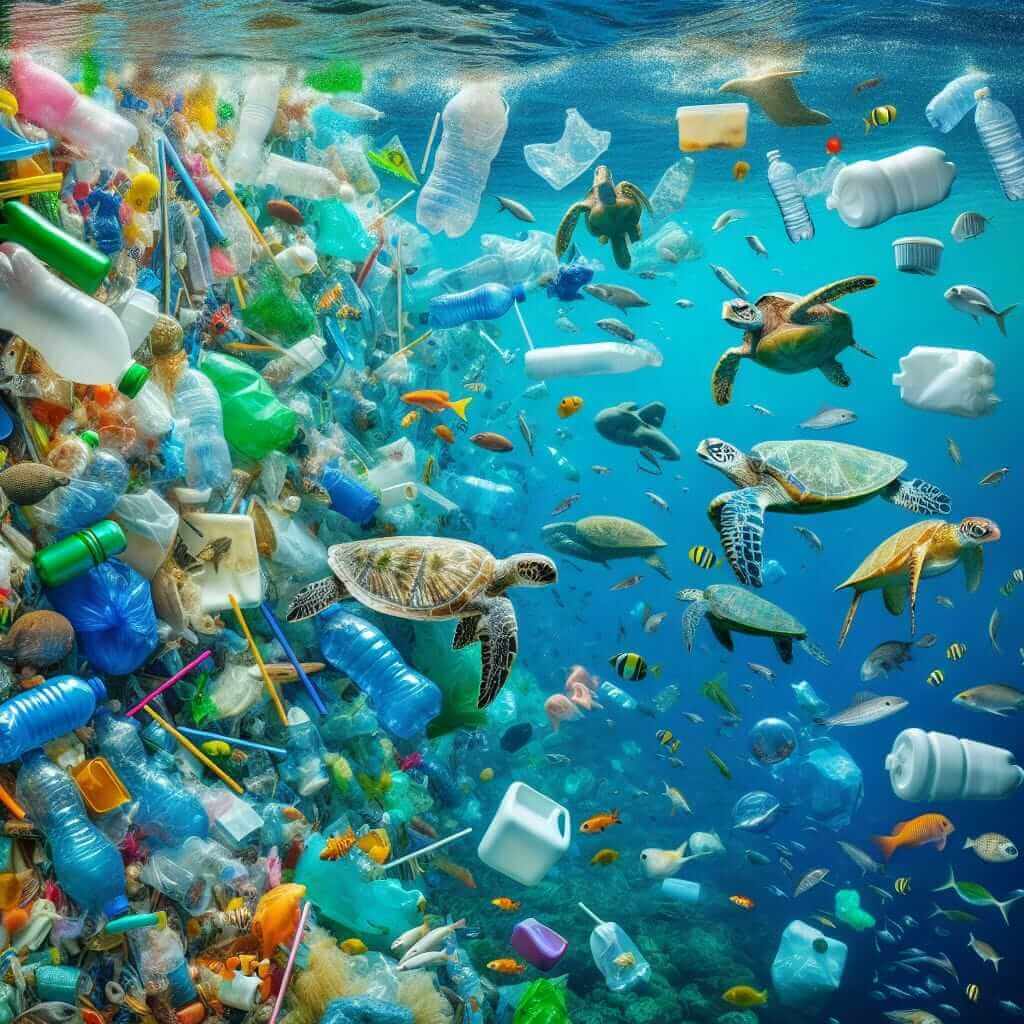Plastic pollution is a pressing global issue with far-reaching consequences. It frequently appears in IELTS Writing Task 2, requiring test-takers to demonstrate their ability to discuss its impact on marine life. This article provides a comprehensive guide to crafting a high-scoring essay on this topic, including a sample answer, vocabulary analysis, and writing tips.
Understanding the Task
IELTS often features questions about the environmental impact of human activities. Here are some potential essay prompts related to the impact of plastic pollution on marine life:
- “Plastic pollution poses a significant threat to marine ecosystems. Discuss the effects of plastic pollution on marine life and suggest solutions to mitigate this problem.”
- “The increasing amount of plastic in the ocean is a major environmental concern. What are the causes of this problem, and what measures can be taken to address it?”
- “Some people argue that the responsibility for reducing plastic pollution in the ocean lies with individuals, while others believe that governments and corporations should be held accountable. Discuss both views and give your own opinion.”
Sample Essay Analysis:
Let’s choose the first prompt for our sample essay:
“Plastic pollution poses a significant threat to marine ecosystems. Discuss the effects of plastic pollution on marine life and suggest solutions to mitigate this problem.”
Analysis of the Task
This task requires a two-part response:
- Discuss the effects: Explain how plastic pollution harms marine organisms and ecosystems.
- Suggest solutions: Provide realistic and practical measures to reduce plastic pollution.
Sample Essay
Plastic pollution has emerged as a critical environmental crisis, posing a substantial threat to the delicate balance of marine ecosystems. The detrimental effects of plastic debris on marine life are manifold and demand immediate attention. This essay will delve into the consequences of plastic pollution on marine organisms and propose potential solutions to alleviate this pressing issue.
One of the most alarming impacts of plastic pollution is its devastating effect on marine animals. Marine creatures often mistake plastic fragments for food, leading to ingestion and entanglement. Ingestion of plastic can block digestive tracts, causing starvation, malnutrition, and even death. For instance, sea turtles often mistake plastic bags for jellyfish, a common prey item, leading to fatal consequences. Furthermore, marine animals can become entangled in plastic debris, restricting their movement, hindering their ability to hunt or feed, and ultimately leading to suffocation or drowning.
Beyond individual organisms, plastic pollution has severe implications for entire marine ecosystems. The accumulation of plastic debris in the ocean can disrupt delicate food webs and habitats. As plastic breaks down into smaller particles known as microplastics, it enters the food chain, accumulating in the tissues of marine organisms. This can have toxic effects and disrupt reproductive cycles, ultimately impacting the health and biodiversity of marine ecosystems. Moreover, the presence of plastic waste can smother coral reefs, vital habitats for countless marine species, leading to their decline and the loss of biodiversity.

Addressing this crisis requires a multi-faceted approach. Firstly, reducing plastic consumption and promoting sustainable alternatives is crucial. Governments, businesses, and individuals must collaborate to implement policies that discourage single-use plastics, encourage reusable alternatives, and promote responsible waste management practices. Secondly, innovative technologies for cleaning up existing plastic pollution need to be developed and implemented. This includes initiatives like ocean cleanup projects and the development of biodegradable plastics.
In conclusion, the impact of plastic pollution on marine life is undeniable and demands immediate action. By understanding the consequences of our plastic consumption and implementing sustainable practices, we can mitigate this threat and safeguard the health of our oceans for generations to come. (Word count: 322)
Vocabulary Notes:
- Manifold (adjective): /ˈmænɪfəʊld/ – Many and various.
- Detrimental (adjective): /ˌdɛtrɪˈmɛnt(ə)l/ – Causing harm or damage.
- Ingestion (noun): /ɪnˈdʒɛstʃ(ə)n/ – The act of taking food or drink into the body.
- Entanglement (noun): /ɪnˈtæŋɡ(ə)lm(ə)nt/ – The state of being twisted together or caught in something.
- Malnutrition (noun): /ˌmalnjuːˈtrɪʃ(ə)n/ – A state of poor nutrition.
- Microplastics (noun): /ˈmʌɪkrəʊˌplæstɪks/ – Extremely small pieces of plastic debris.
- Bioaccumulate (verb): /ˌbaɪoʊəˈkjuːmjʊleɪt/ – To gradually increase in concentration in living organisms as they are passed up a food chain.
- Biodiversity (noun): /ˌbaɪoʊdaɪˈvɜːsɪti/ – The variety of plant and animal life in a particular habitat.
- Smother (verb): /ˈsmʌðə/ – Kill or extinguish by covering so as to exclude air.
- Mitigate (verb): /ˈmɪtɪɡeɪt/ – Make (something bad) less severe, serious, or painful.
Conclusion
Writing a compelling essay on the impact of plastic pollution on marine life requires a clear understanding of the issue, relevant vocabulary, and a well-structured argument. By following the tips and guidance provided in this article, you can improve your chances of achieving a high band score in your IELTS Writing Task 2. Remember to practice regularly and familiarize yourself with different question types to enhance your writing skills further. Good luck!